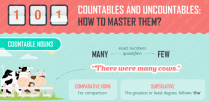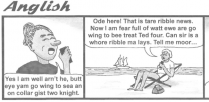
English is influenced by so many other languages that most rules have exceptions; verbs are no different.
Regular verbs are simple: “I dance”, “I danced”, “I will dance”, “I want to dance”, “I am dancing”. The main quirk of regular verbs are those that end in a consonant and “y”, such as “copy” or “study”–the “y” is replaced by “-ies” in the present tense and by “-ied” in the past tense.
“I want to study tonight, as I was half asleep when I studied this morning. Coffee might have woken me up.”
This is all quite simple until that last verb–“woken” is an “irregular” verb. Irregular verbs have a variety of irregularities; some change so much that each tense has a completely different word, and some do not change at all. Examples of irregular verb forms can illustrate this, starting with the easiest: verbs that do not change from their root word.
Set, Put, Quit, Rid, Shed
Other than tacking on an “s” or an “-ing”, these sample verbs retain their base form. When a verb does not change, inspect the rest of the sentence to determine the tense.
Simple Past Tense
“Maggie put a toad in her brother’s lunch box yesterday.”
“When it became hot, we all shed our coats and walked to the river.”
Past Participle
“The house had been rid of mice only after the family got a cat.”
“A fastball was coming–the pitcher’s stance had put the batter on alert.”
Present Participle
“Bob is quitting, so we can set his desk on fire.”
“The cowboy always rides off just as the sun is setting.”
Simple Present Tense
A little more difficult; in this tense, the base form remains, but the verb gains an “s” in third person singular (he/she/it).
“Constance sets the table with her best dishes on holidays.”
“Listening to soft music rids me of tension.”
…But not always, if the subject is plural.
“Horses put their ears back when agitated, but not when a person puts hay in front of them.”
“The fans quit cheering as the Bears are intercepted and their quarterback quits the field.”
Be, Write, Drive, Swim, Fly
Some of the most irregular of the irregular verbs, many of these change completely from tense to tense, or even from singular to plural. One of the most scandalous of these pesky verbs is “to be“. The infinitive “to be” becomes “is, am, are” for the simple present tense: “He is walking, I am swimming, and the birds are flying.” For simple past, “was, were”: “He was looking for them, but they were hidden.” For past participle, “been”: “Those darn chickens have been eating my garden seed.” Present participle is “being”: “The dog knows he gets a bath on Tuesdays, so he is being very quiet, hoping we’ll forget all about him.”
Here are a few less stressful irregulars:
Infinitive: “to write“. Simple present: “write(s)”. Simple past: “wrote”. Past participle: “written”. Present participle: “writing”.
Infinitive: “to drive“. Simple present: “drive(s)”. Simple past: “drove”. Past participle: “driven”. Present participle: “driving”.
Infinitive: “to swim“. Simple present: “swim(s)”. Simple past: “swam”. Past participle: “swum”. Present participle: “swimming”.
Infinitive: “to fly“. Simple present: “flies, fly”. Simple past: “flew”. Past participle: “flown”. Present participle: “flying”.
The verb “eat” is an irregular verb that is used constantly. Are you familiar with all of its tenses?







